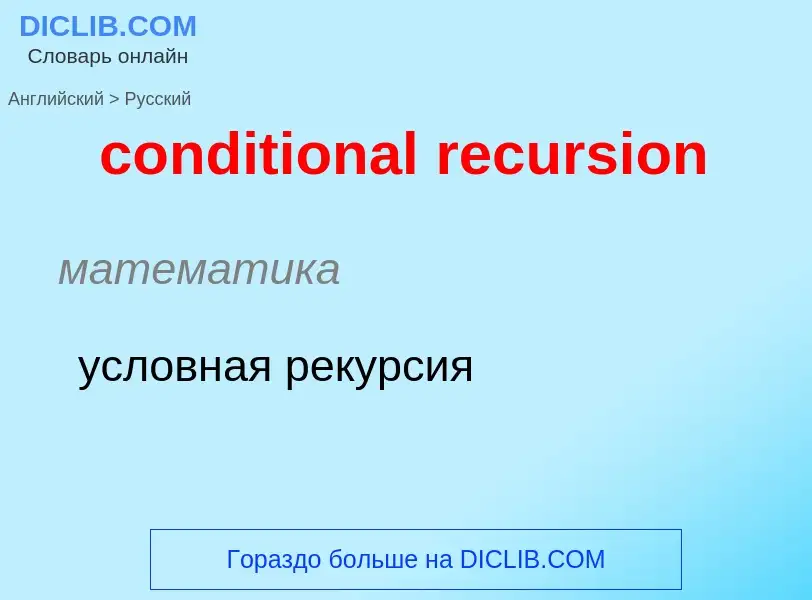Перевод и анализ слов искусственным интеллектом ChatGPT
На этой странице Вы можете получить подробный анализ слова или словосочетания, произведенный с помощью лучшей на сегодняшний день технологии искусственного интеллекта:
- как употребляется слово
- частота употребления
- используется оно чаще в устной или письменной речи
- варианты перевода слова
- примеры употребления (несколько фраз с переводом)
- этимология
conditional recursion - перевод на русский
математика
условная рекурсия
общая лексика
условное наклонение
математика
условная информация
математика
условное среднее
[ri'kə:sivnis]
общая лексика
рекурсивность
Смотрите также
существительное
логика
рекурсивность
Определение
Википедия
In recursion theory, α recursion theory is a generalisation of recursion theory to subsets of admissible ordinals . An admissible set is closed under functions, where denotes a rank of Godel's constructible hierarchy. is an admissible ordinal if is a model of Kripke–Platek set theory. In what follows is considered to be fixed.
The objects of study in recursion are subsets of . These sets are said to have some properties:
- A set is said to be -recursively-enumerable if it is definable over , possibly with parameters from in the definition.
- A is -recursive if both A and (its relative complement in ) are -recursively-enumerable. It's of note that -recursive sets are members of by definition of .
- Members of are called -finite and play a similar role to the finite numbers in classical recursion theory.
- Members of are called -arithmetic.
There are also some similar definitions for functions mapping to :
- A function mapping to is -recursively-enumerable, or -partial recursive, iff its graph is -definable in .
- A function mapping to is -recursive iff its graph is -definable in .
- Additionally, a function mapping to is -arithmetical iff there exists some such that the function's graph is -definable in .
Additional connections between recursion theory and α recursion theory can be drawn, although explicit definitions may not have yet been written to formalize them:
- The functions -definable in play a role similar to those of the primitive recursive functions.
We say R is a reduction procedure if it is recursively enumerable and every member of R is of the form where H, J, K are all α-finite.
A is said to be α-recursive in B if there exist reduction procedures such that:
If A is recursive in B this is written . By this definition A is recursive in (the empty set) if and only if A is recursive. However A being recursive in B is not equivalent to A being .
We say A is regular if or in other words if every initial portion of A is α-finite.

![Malyutin]], 1892 Malyutin]], 1892](https://commons.wikimedia.org/wiki/Special:FilePath/First matryoshka museum doll open.jpg?width=200)
![Front face of [[Giotto]]'s ''[[Stefaneschi Triptych]]'', 1320, recursively contains an image of itself (held up by the kneeling figure in the central panel). Front face of [[Giotto]]'s ''[[Stefaneschi Triptych]]'', 1320, recursively contains an image of itself (held up by the kneeling figure in the central panel).](https://commons.wikimedia.org/wiki/Special:FilePath/Polittico stefaneschi, verso.jpg?width=200)
![[[Ouroboros]], an ancient symbol depicting a serpent or dragon eating its own tail. [[Ouroboros]], an ancient symbol depicting a serpent or dragon eating its own tail.](https://commons.wikimedia.org/wiki/Special:FilePath/Serpiente alquimica.jpg?width=200)
![Recently refreshed [[sourdough]], bubbling through [[fermentation]]: the recipe calls for some sourdough left over from the last time the same recipe was made. Recently refreshed [[sourdough]], bubbling through [[fermentation]]: the recipe calls for some sourdough left over from the last time the same recipe was made.](https://commons.wikimedia.org/wiki/Special:FilePath/Sourdough.jpg?width=200)
